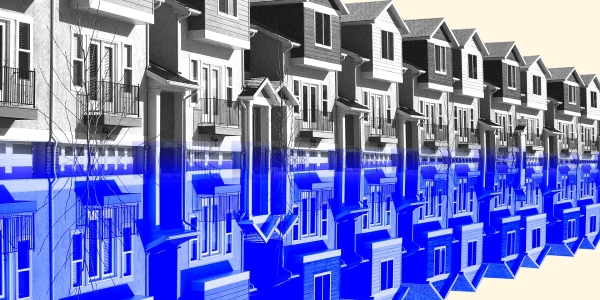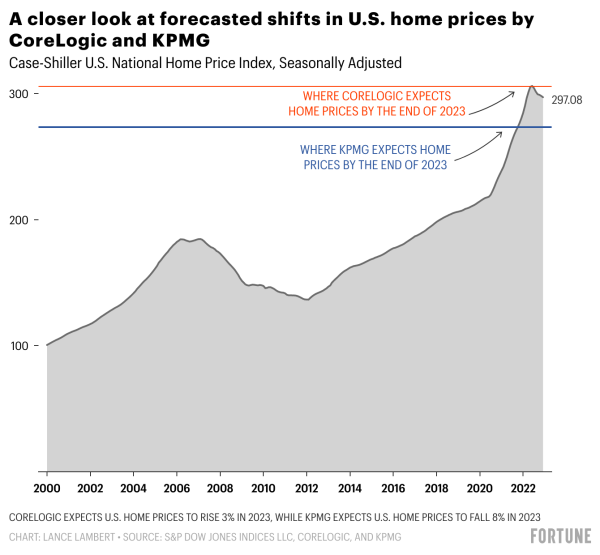
For 124 consecutive months, spanning from the bottom of the housing crash in February 2012 through the top of the Pandemic Housing Boom in June 2022, national home prices as measured by the seasonally adjusted Case-Shiller National Home Price Index rose on a month-over-month basis. That was until last year’s mortgage rate shock set off a housing correction.
Through December, U.S. home prices have fallen for six straight months. Since peaking in June, U.S. home prices have fallen 2.7% on a seasonally adjusted basis, and 4.4% without seasonal adjustment.
On one hand, that 2.7% drop in single-family home prices marks the second-biggest price correction of the post–World War II era. On the other hand, the ongoing housing correction through December is a mild correction compared to the 26% peak-to-trough decline between 2007 and 2012.
Where does this housing correction head from here? The answer depends on who you ask.
In the bullish camp, you can find CoreLogic. The real estate research firm expects U.S. home prices to rise 3% between December 2022 to December 2023. If CoreLogic is right, then U.S. home prices would end 2023 back at price levels achieved at the height of the boom in June 2022.
In the bearish camp, you’ll find KPMG. Heading forward, the Big Four accounting firm expects U.S. home prices, as measured by Case-Shiller, to fall 8% in 2023. If KPMG’s latest forecast is right, the U.S. housing market would soon experience its sharpest home price decline since 2008, a year that saw national home prices plummet 11.9%.


In the eyes of CoreLogic, U.S. home prices should be nearing their bottom right about now.
“The continued shortage of for-sale homes is likely to keep price declines modest, which are projected to top out at 3% peak to trough [decline],” wrote Selma Hepp, chief economist at CoreLogic, in a report published on Tuesday. “Home price depreciation and strong income growth are expected to boost affordability, which is particularly important for first-time buyers. This group has accounted for a higher share of mortgage applications since last summer, as first-time buyers don’t need to surrender an extremely low mortgage rate like current homeowners.”
While CoreLogic expects national home prices to bottom out this spring, the firm acknowledges that some “popular [markets] during the COVID-19 pandemic” could continue to see “major corrections” through the spring season. (Here’s how the ongoing home price correction, or lack thereof, looks across the country through January.)
Unlike researchers at CoreLogic, economists at KPMG foresee the home price correction continuing all the way through 2023. They also foresee it hitting more than just bubbly housing markets out West.
“The housing recession is expected to deepen as the Federal Reserve doubles down on its efforts to derail inflation. The pace at which home values and rents fall will play a key role in how fast inflation cools,” wrote Diane Swonk, chief economist at KPMG, in a report published earlier this week.
The reason U.S. home prices might have further to fall, Swonk says, boils down to the fact that housing “affordability is deteriorating” and she expects “additional rate hikes by the Fed” to “keep mortgage rates closer to 7% than 6% [for] much of the year.”
Through the year, Swonk says banks will have no choice but to tighten lending standards, while at the same time more homeowners will face higher property taxes to reflect “the surge in home values coming out of the pandemic.” Those factors, coupled with strained affordability, will help to put downward pressure on national home prices.
That said, Swonk says that “acute supply shortages [could] limit the depreciation in home values” while some stable markets, including many in the Midwest, see “flat to modest price growth in 2023.”
Between March 2020 and June 2022, U.S. home prices soared 41.2%. Through December, those total Pandemic Housing Boom gains have slipped to 37.4%.
If CoreLogic is correct, U.S. home prices would end 2023 with total Pandemic Housing Boom gains back up to 41.2%. However, if KPMG’s predicted 8% national home price dip occurs, it’d mean U.S. home prices in December 2023 would be 26.4% higher than in March 2020.
Want to stay updated on the housing correction? Follow me on Twitter at @NewsLambert.
